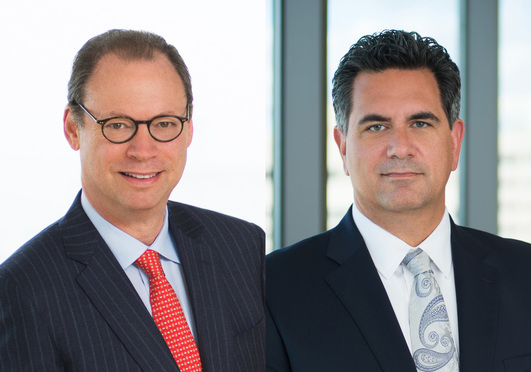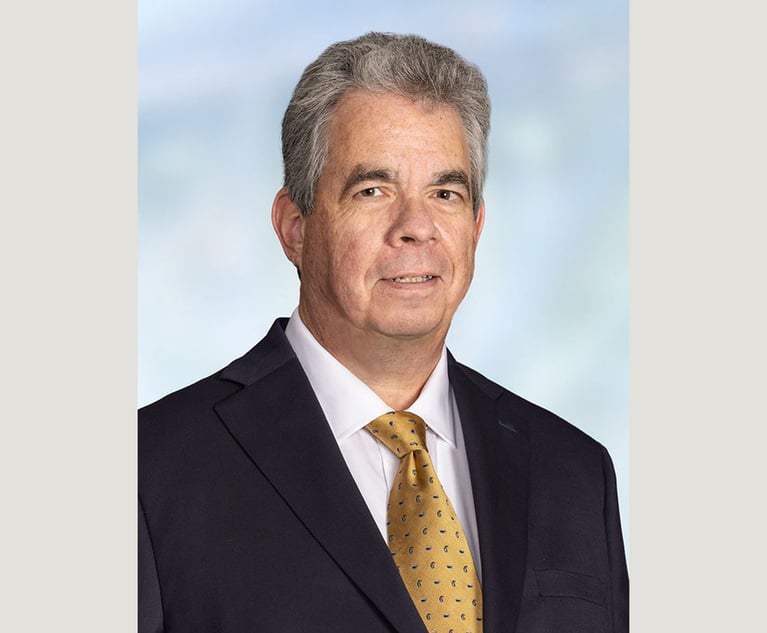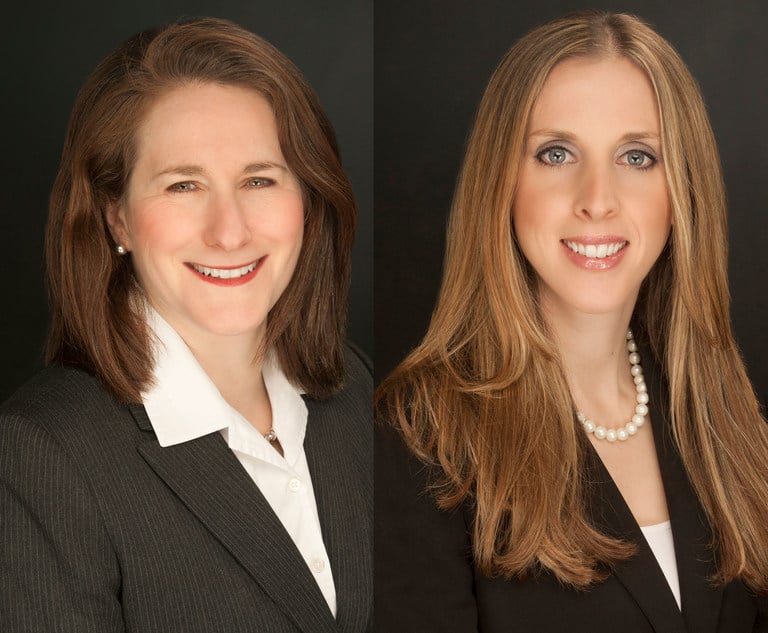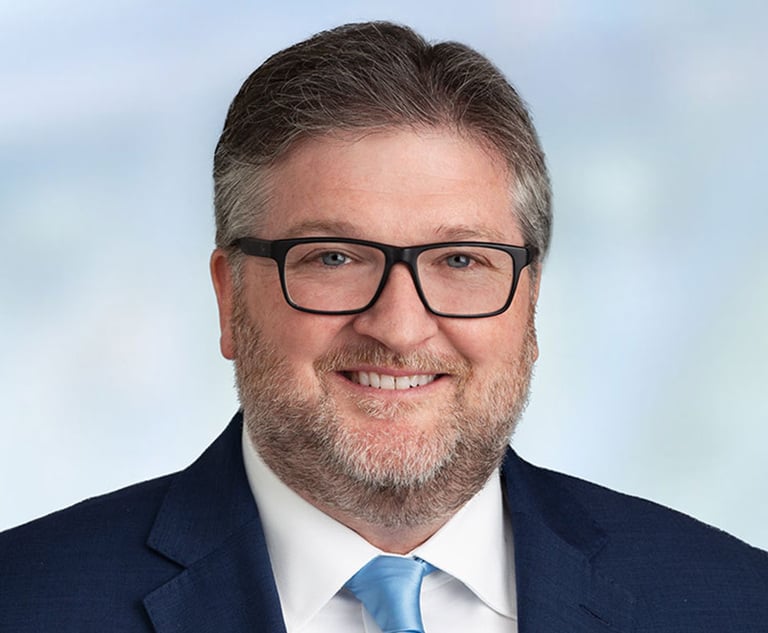Bankrupt Debtors Fight for PPP Lifeline in COVID-19 Era
Today we examine another provision of the code—Section 525—the anti-discrimination section, and its implications during COVID-19.
July 09, 2020 at 12:20 PM
11 minute read
 Left to right: Andrew Kassner and Joseph Argentina of Drinker Biddle & Reath.
Left to right: Andrew Kassner and Joseph Argentina of Drinker Biddle & Reath.
The pandemic has spurred analysis of legal issues as businesses grapple with their respective relationships with both private and public entities. For example, corporate general counsel suddenly were flooded with law firm alerts analyzing the scope of force majeure clauses—a contract term that is rarely the focus of negotiation. Last month the authors examined how bankruptcy courts are addressing post-petition retail rent obligations differently during the pandemic under Sections 105 and 365 of the Bankruptcy Code. Today we examine another provision of the code—Section 525—the anti-discrimination section, and its implications during COVID-19.
A number of bankruptcy courts have been faced with a novel issue on an emergency basis. In response to the pandemic, the federal government enacted the highly published payroll protection loan program to assist devastated small businesses and nonprofit enterprises. However, the Small Business Administration (SBA) issued regulations that disqualified Chapter 11 debtors from participating in the program. Several debtors have sought emergency injunctions to compel the SBA to process their loan applications notwithstanding their ongoing bankruptcy cases. The results have been mixed; some courts have directed the SBA to process the applications, and others uphold the SBA's exclusion of bankrupt debtors from the PPP lifeline.
The Archdiocese of Santa Fe
This issue was recently considered by the U.S. Bankruptcy Court for the District of New Mexico in Roman Catholic Church of the Archdiocese of Santa Fe v. U.S. Small Business Administration (In re Roman Catholic Church of the Archdiocese of Santa Fe), Adv. Case No. 20-01026 (May 1, 2020). According to the opinion, the archdiocese filed for Chapter 11 on Dec. 3, 2018, and has been operating as debtor-in-possession.
On March 27, in response to the pandemic, the president signed the Coronavirus Aid, Relief, and Economic Security Act, H.R. 748 P.L. 115-136 (the CARES Act). The court noted, "The CARES Act is intended, among other things, to provide stimulus to the economy by distributing approximately $2.3 trillion to various industries, programs, and individuals." The CARES Act added a new "Paycheck Protection Program" to be administered by the SBA. The PPP program enabled "eligible recipients" to receive "paycheck protection loans." The funds were to be used for various operational costs related to payroll, benefits, mortgage payments, utilities and interest payments.
The court noted the loans provided by the PPP came with "extremely favorable terms." Borrowers were not required to pledge collateral or provide guarantees. A borrower's creditworthiness was not relevant. No fees were charged. The interest rate was 1%. The loans were forgiven if the funds were used as required. Moreover, PPP had few eligibility requirements. Applicants were required to be a small business, nonprofit organization, veterans organization, or Tribal business, generally have fewer than 500 employees, been in operation on Feb. 15, and have employees to whom salary and payroll taxes were paid.
Funds were available on a first-come, first-served basis. The court wrote: "Demand for the PPP funds has been overwhelming. The funds were exhausted once, but were replenished by Congress on or about April 24, 2020." As of the date of the opinion, the court did not know the current status of PPP funds and further replenishment prospects.
The CARES Act also provided the SBA with "emergency rulemaking authority" to issue regulations to carry out the law. On April 2, the SBA issued the application form to apply for a PPP loan. The form stated applicants involved in any bankruptcy were not eligible for a loan.
The court found the debtor met all of the eligibility requirements under the CARES Act. However, when the debtor filed an application for a $900,000 loan, its bank would not process the loan because of the bankruptcy ineligible provision. On April 28, the SBA issued a second interim final rule, which expressly disqualified bankruptcy debtors from the PPP. The court observed there were no administrative appeals or remedies available for applicants to seek review of the SBA's decision to exclude bankrupt debtors from PPP.
The court noted that, like many businesses, the debtor had been severely financially harmed by the federal, state, and local government "lockdown" orders. At the time the opinion was issued on May 1, the governor of New Mexico had announced that the stay-at-home order would be extended through at least May 15. The court noted that the debtor was losing about $300,000 per month, and losses would continue until, at a minimum, the lockdown orders were lifted. The court wrote, "Without a PPP loan, the plaintiff's operations and reorganization effort will be substantially adversely affected. The PPP funds are essential to plaintiff's 'fresh start.'"
The debtor filed a complaint seeking a preliminary injunction that would compel the SBA to process the debtor's loan application notwithstanding its status as a Chapter 11 debtor. The court conducted a hearing on April 30, but converted it to a trial on the merits. The debtor argued that the SBA's exclusion of bankrupt debtors from the PPP loan program was not permitted under the Administrative Procedures Act. The APA authorizes a court to set aside agency action that is, among other things, "arbitrary, capricious, an abuse of discretion, or otherwise not in accordance with law" or "in excess of statutory jurisdiction, authority, or limitations, or short of statutory right." See 5 U.S.C. Section 706(2).
The court stated that although the standard is generally deferential to the agency, a court must determine whether the agency considered all relevant factors, and whether there had been a clear error of judgment. The court concluded that the SBA's actions were arbitrary and capricious. The court reasoned that while a borrower's bankruptcy would be relevant for a normal loan program, PPP was "not a loan program at all. It is a grant or support program." The CARES Act did not require a borrower be creditworthy. In fact, financial distress was presumed. Further, Congress expressly excluded debtors from another CARES Act program that provided loans to midsize businesses. The court reasoned the "unmistakable implication is that Congress did not intend to exclude bankruptcy debtors from the PPP."
The court also sharply criticized the SBA's argument that bankruptcy debtors present an unacceptably high risk for unauthorized use of funds. The opinion describes how Chapter 11 debtors are under court supervision, must file detailed operating reports with attached bank statements, in cases monitored by creditor committees. The court stated "In short, the Chapter 11 bankruptcy system is a hundred-eyed Argus. In contrast, nondebtors can spend their PPP funds without any oversight." The court found the SBA's justification for excluding bankruptcy debtors "so weak the court has to wonder if [the SBA] really believes it."
The court held the SBA had exceeded its statutory authority in denying PPP loans to bankrupt debtors. The court reasoned that Congress had directly addressed the PPP eligibility requirements, and charged the SBA with issuing regulations to carry out the program. The SBA had no authority to change the eligibility requirements. The court found that was exactly what it had done by adding a nonbankruptcy requirement into the eligibility criteria.
Finally, the court concluded that the SBA's actions violated Section 525(a) of the Bankruptcy Code, which prohibits discriminatory treatment by the government of a person that is or has been a bankrupt debtor. Specifically, the section provides that:
"a governmental unit may not deny, revoke, suspend, or refuse to renew a license, permit, charter, franchise, or other similar grant to, condition such a grant to, discriminate with respect to such a grant against, … a person that is or has been a debtor under this title … solely because such bankrupt or debtor is or has been a debtor under this title." See 11 U.S.C. Section 525(a).
The court noted in a footnote that the government does not violate Section 525(a) by taking a borrower's bankruptcy status into account when considering a loan application. However, the court had found PPP was not a loan program but a grant or support program. As such, denying the debtor access to PPP funds solely because it was a debtor violated Section 525(a).
The court summarized its view in quite a holding:
With only the flimsiest of justifications the defendant took one of many underwriting criteria from its "normal" loan programs (bankruptcy status of the borrower), changed it to an eligibility condition, and then applied it to an emergency grant program where it clearly had no place. The defendant's inexplicable and highhanded decision to rewrite the PPP's eligibility requirements in this way was arbitrary and capricious, beyond its statutory authority, and in violation of 11 U.S.C. Section 525(a). By a separate final judgment, the court will grant the plaintiff the relief it requests. If the defendant's actions result in the plaintiff not obtaining the $900,000 it requested, the plaintiff may file an adversary proceeding for compensatory and, if appropriate, punitive damages.
Numerous other courts have ruled in favor of debtors requesting orders directing access to PPP funds. See Springfield Hospital v. Carranza (In re Springfield Hospital), Case No. 19-10283 (Bankr. D. Vt. May 4, 2020) (granting debtor's emergency motion for restraining order forcing SBA to process PPP application), Penobscot Valley Hospital v. Carranza (In re Penobscot Valley Hospital), Adv. No. 20-ap-01005 (Bankr. D. Me. May 1, 2020) (issuing TRO preventing denial of PPP loan based on debtor status); Calais Regional Hospital v. Carranza (In re Calais Regional Hospital), Adv. Case No. 20-1006 (Bankr. D. Me. May 1, 2020) (same).
That being said, some courts have denied such requests to obtain injunctions compelling the SBA to process Chapter 11 debtor loan applications. See In re Blue Ice Investments v. U.S. Small Business Administration (In re Blue Ice Investments), Adv. No. 2:20-AP-00095 (Bankr. Ariz. May 26, 2020) (finding the SBA acted within its authority in denying PPP to bankrupt debtors); The Diocese of Rochester v. U.S. Small Business Administration (In re Diocese of Rochester), Adv. No. 20-cv-06243 (W.D.N.Y. June 10, 2020) (finding SBA did not overstep statutory authority and loans are exempt from antidiscrimination provision of the Bankruptcy Code).
One interesting situation involved a case where the U.S. Bankruptcy Court for the Southern District of Texas issued a temporary restraining order authorizing the debtor to submit a PPP loan application to any lender with the words "or presently involved in any bankruptcy" stricken from the SBA's form, and process the loan without any consideration of its involvement in any bankruptcy. See Hidalgo County Emergency Service Foundation v. Carranza (In re Hidalgo County Emergency Service Foundation), Adv. No. 20-2006 (Bankr. S.D. Tex. April 25, 2020). The court's decision was reversed on appeal by the U.S. Court of Appeals for the Fifth Circuit in Hidalgo County Emergency Service Foundation v. Carranza, Case No. 20-40368 (June 22, 2020) which held the Small Business Act forecloses injunctive relief against the SBA and Fifth Circuit precedent prohibits injunctive relief against the SBA. As such, the Fifth Circuit held the Bankruptcy Court exceeded its authority when it issued the preliminary injunction, and vacated the TRO.
Conclusion
The PPP program was created to aid small businesses from falling into distress as a result of the pandemic and governmental closure orders. It is ironic that operating businesses that are the most distressed and in need of relief under the Bankruptcy Code are not viewed by the SBA as worthy to be eligible for relief under the CARES Act. Bankruptcy courts will have to continue to reconcile these two federal relief-based statutes that were both enacted to assist financially distressed businesses.
Andrew C. Kassner is co-chair of Faegre Drinker Biddle & Reath and a member of the firm's board. He can be reached at andrew.kassner@faegredrinker.com or 215-988-2554.
Joseph N. Argentina Jr. is a senior attorney in the firm's corporate restructuring practice group in the Philadelphia and Wilmington, Delaware, offices. He can be reached at [email protected] or 215-988-2541.
This content has been archived. It is available through our partners, LexisNexis® and Bloomberg Law.
To view this content, please continue to their sites.
Not a Lexis Subscriber?
Subscribe Now
Not a Bloomberg Law Subscriber?
Subscribe Now
NOT FOR REPRINT
© 2025 ALM Global, LLC, All Rights Reserved. Request academic re-use from www.copyright.com. All other uses, submit a request to [email protected]. For more information visit Asset & Logo Licensing.
You Might Like
View All
Former Perkins Coie Partner Moves to Stradley Ronon in Chicago

Proskauer Rose Investment Management Trio Jumps to Stradley Ronon


Stradley Ronon Bolsters Investment Management Practice With Vanguard Hire
4 minute readLaw Firms Mentioned
Trending Stories
Who Got The Work
J. Brugh Lower of Gibbons has entered an appearance for industrial equipment supplier Devco Corporation in a pending trademark infringement lawsuit. The suit, accusing the defendant of selling knock-off Graco products, was filed Dec. 18 in New Jersey District Court by Rivkin Radler on behalf of Graco Inc. and Graco Minnesota. The case, assigned to U.S. District Judge Zahid N. Quraishi, is 3:24-cv-11294, Graco Inc. et al v. Devco Corporation.
Who Got The Work
Rebecca Maller-Stein and Kent A. Yalowitz of Arnold & Porter Kaye Scholer have entered their appearances for Hanaco Venture Capital and its executives, Lior Prosor and David Frankel, in a pending securities lawsuit. The action, filed on Dec. 24 in New York Southern District Court by Zell, Aron & Co. on behalf of Goldeneye Advisors, accuses the defendants of negligently and fraudulently managing the plaintiff's $1 million investment. The case, assigned to U.S. District Judge Vernon S. Broderick, is 1:24-cv-09918, Goldeneye Advisors, LLC v. Hanaco Venture Capital, Ltd. et al.
Who Got The Work
Attorneys from A&O Shearman has stepped in as defense counsel for Toronto-Dominion Bank and other defendants in a pending securities class action. The suit, filed Dec. 11 in New York Southern District Court by Bleichmar Fonti & Auld, accuses the defendants of concealing the bank's 'pervasive' deficiencies in regards to its compliance with the Bank Secrecy Act and the quality of its anti-money laundering controls. The case, assigned to U.S. District Judge Arun Subramanian, is 1:24-cv-09445, Gonzalez v. The Toronto-Dominion Bank et al.
Who Got The Work
Crown Castle International, a Pennsylvania company providing shared communications infrastructure, has turned to Luke D. Wolf of Gordon Rees Scully Mansukhani to fend off a pending breach-of-contract lawsuit. The court action, filed Nov. 25 in Michigan Eastern District Court by Hooper Hathaway PC on behalf of The Town Residences LLC, accuses Crown Castle of failing to transfer approximately $30,000 in utility payments from T-Mobile in breach of a roof-top lease and assignment agreement. The case, assigned to U.S. District Judge Susan K. Declercq, is 2:24-cv-13131, The Town Residences LLC v. T-Mobile US, Inc. et al.
Who Got The Work
Wilfred P. Coronato and Daniel M. Schwartz of McCarter & English have stepped in as defense counsel to Electrolux Home Products Inc. in a pending product liability lawsuit. The court action, filed Nov. 26 in New York Eastern District Court by Poulos Lopiccolo PC and Nagel Rice LLP on behalf of David Stern, alleges that the defendant's refrigerators’ drawers and shelving repeatedly break and fall apart within months after purchase. The case, assigned to U.S. District Judge Joan M. Azrack, is 2:24-cv-08204, Stern v. Electrolux Home Products, Inc.
Featured Firms
Law Offices of Gary Martin Hays & Associates, P.C.
(470) 294-1674
Law Offices of Mark E. Salomone
(857) 444-6468
Smith & Hassler
(713) 739-1250





